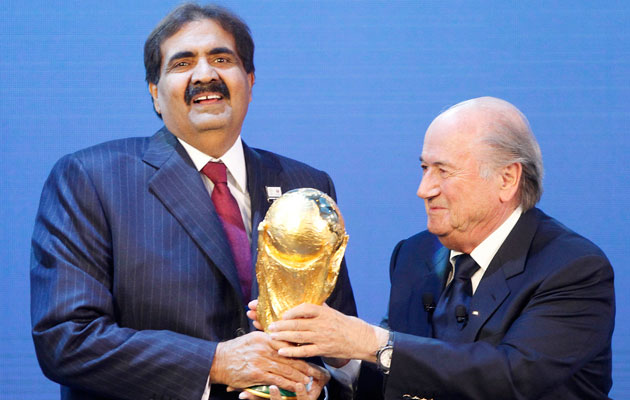Qatar’s 2022 World Cup organisers have appealed for the critical outside world to show a patience as the Gulf state remodels its controversial and outmoded labour laws.
The first Middle East nation to host the finals has been assailed in all directions from the manner of its bid campaign to the staging date and to labour conditions for immigrant workers, their horrific accident death rate and low pay averaging a reported $300 a month.
Both Theo Zwanziger, German member of the FIFA executive committee, and his likely imminent successor within the world federation’s governing authority, Wolfgang Niersbach, have proposed a springtime deadline by which the Qatar government should demonstrate significant progress.
Otherwise, according to both the former and current German federation presidents, FIFA should then consider stripping Qatar of the finals.
The Qataris have insisted that change is under way but cannot be imposed overnight and critics should give them the benefit of time.
Nasser Al-Khater, communications director of the Supreme Committee for the 2022 World Cup, has just set out the case for patience at a time of increasingly feverish politicking within FIFA in the run-up to a presidential election in May.
Sepp Blatter, 78-year-old Swiss administrator who signed the hosting contract on behalf of FIFA back in December 2010, has always insisted that removing the finals was out of the question. His stance was reinforced when the ethics investigation by now-departed American lawyer Michael Garcia, failed to unholster the ‘smoking gun’ which critics had craved.
Al-Khater, in stating the case for patience, conceded that the controversial, medieval kafala system of tied employment was redundant in the modern world.
He said: “The kafala system has been instituted a very long time ago and I think there’s a recognition that it does not work any more and is not suitable in this day and age.
“However, just like any other country in the world when you change a law it takes time. You can’t close your eyes and say: ‘Tomorrow we’re going to change the law’ or you will have so many chain reactions after that.
“You need to make sure that, when you draft a law, you also draft the enforcement mechanisms of the law. So that’s why all we ask is for people to be patient.
“The government has been doing a lot in drafting new laws and in terms of reviewing the new laws and putting enforcement mechanisms in place. They are looking at a complete overhaul of the labour system and not just kafala because kafala is only one element to be addressed.
“This country is only 40 years old and what’s happened here in that time has taken some other countries thousands of years.
“Sometimes your economy develops at a certain rate and your population develops at a certain rate but not every single thing around it grows at the same rate. Certain elements need to catch up. We are confident we will reach that but it’s just taking some time.”
Al-Khater was not the only senior sports administrator this week to demonstrate a willingness to find a working compromise between local traditional and religious culture and the demands of engaging with the western world.
A younger generation in Qatar is accepting a pragmatic price must be paid in terms of serving the ‘soft power’ strategy which, though sport, has rocketed the oil-and-gas-rich state to international visibility.
Provision of alcohol, for example and according to the secretary-general of the Qatar Olympic Committee, is a inevitable consequence of the development of a sports tourism industry.
Sheikh Saoud Adulrahman Al-Thani explained: “First, beer and alcoholic drinks are already being offered in some restaurant, bars and hotels in Doha and I don’t see this as a big problem.
“When you bid to host a sports event they show you the requirements . . . if FIFA request it in 2022 we will do it because when you sign a contract is a contract and you have to fulfil all the rules and regulation to host the event.”
Qatar will not be the only sports host to accept that sponsorship cash rules.
As much was evident at the World Cup finals in Brazil last year. Special provisions were enacted in all host cities to set aside laws prohibiting the sale of alcohol within stadia to meet the contract exigencies of FIFA sponsor Budweiser.
Critics of both Qatar and Blatter’s FIFA, from rights campaigners to trades unions, will not be mollified until they believe the world federation is flexing its muscles as powerfully on humanitarian issues as it does in self-serving its own commercial interests.







